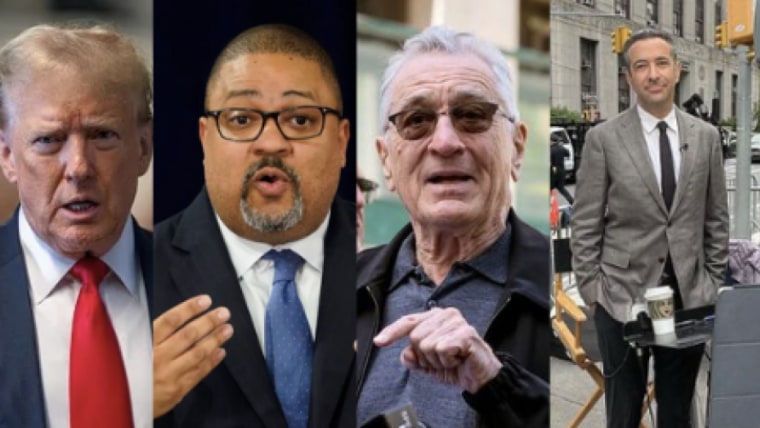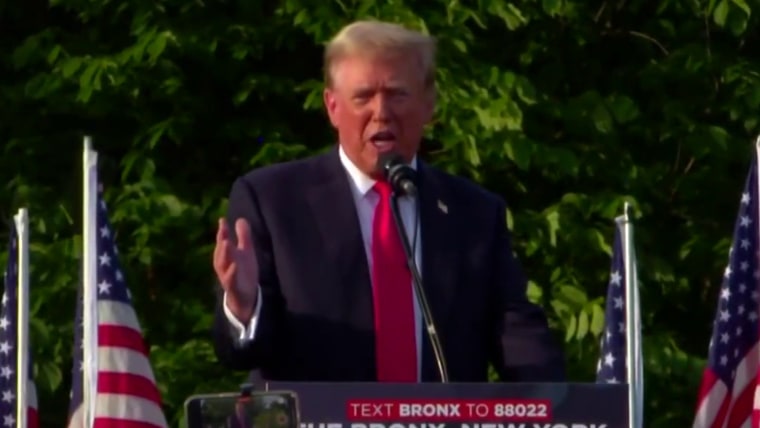As the verdict in Donald Trump’s criminal trial in Manhattan approaches, the former president isn’t even attempting to project an image of a law-abiding citizen but instead is leaning into an outlaw persona by affiliating with people accused or convicted of crimes. It’s a vulgar gambit to turn a traditional liability into a political asset, and an attempt to discredit the legitimacy of the criminal justice system’s focus on him and his allies.
As The New York Times reports, in recent days Trump has sought to conspicuously affiliate with people accused of crimes or even convicted of them. At a Bronx rally Thursday, Trump spoke alongside rappers Sheff G and Sleepy Hallow, who are facing counts of conspiracy to commit murder and weapons possession. (The men have pleaded not guilty and are out on bail.) Saturday, Trump tried to woo a heavily skeptical crowd at the Libertarian Party’s national convention by promising to commute the life sentence of Ross Ulbricht, operator of the black market Silk Road website. And at that event, Trump posed for a photo with rapper Afroman, who pleaded guilty to punching a woman at one of his concerts.
Trump cares not about the law per se but about the legal system punishing his enemies or anyone he deems disorderly.
Trump’s hobnobbing with rappers who’ve had run-ins with the law is part of a crude and racialized optics game. Trump has previously leaned on Black entertainers — instead of political leaders — to serve as high-profile surrogates to win the attention of Black voters. He has also said that he believes his criminal charges and even his mug shot have increased his appeal in the Black community, suggesting that he, too, is a victim of a system that has sent too many Black people to jail. Trump combined these two strategic “insights” by appearing at the Bronx rally Thursday framed as an attempt to court minority voters with Sheff G and Sleepy Hallow, rappers accused of sweeping gang-related crimes. He treated them as exotic mascots — at one point he praised Sheff G’s jewel-encrusted grill, quipping ironically, “I got to get my teeth like that” — all while pushing a tough-on-crime message.
The paradox of Trump’s getting chummy with people charged with serious crimes while pushing for crackdowns on crime can be resolved by noting two things. First, Trump thinks he can win over Black voters by presenting them with alleged gangsters and entertainers, the kinds of racist stereotypes he seems to embrace and seems to believe will provide him with currency among Black voters. (And in the vein of offensive stereotypes, he has also tried using sneakers and fried chicken to appeal to Black voters.) In Trump's estimation, this simplistic deployment of tropes should help him overcome most Black voters’ revulsion at Trump’s white nationalism and the extreme ideological conservatism of the GOP.

Second, Trump cares not about the law per se but about the legal system punishing his enemies or anyone he deems disorderly. And he believes that he and anyone he deems part of his in-group should be immune to that system. That in-group includes his “team of felons,” the many members of his inner circle who have shown up in court for him who have faced prison time or face the possibility of it. (He has pardoned some of them.) His in-group also includes Jan. 6 insurrectionists, whom he has promised to pardon, because they’re his die-hard supporters. And it includes rappers charged with gang-related crimes — as long long as they say they like him.
Throughout his legal troubles, Trump has presented himself as a victim of political persecution, and he most likely hopes to sap the political power of a potential guilty verdict of its power by doing so. Hoever his response has been not solely to insist on innocence, but to attack the system that threatens to hold him to account. His vision for that system is for it to operate leniently — if at all — for anyone who agrees to follow him, and for it to be merciless on anyone who opposes him. That “heads-I-win, tails-you-lose” attitude toward the criminal justice system is about not justice but about power and control.

